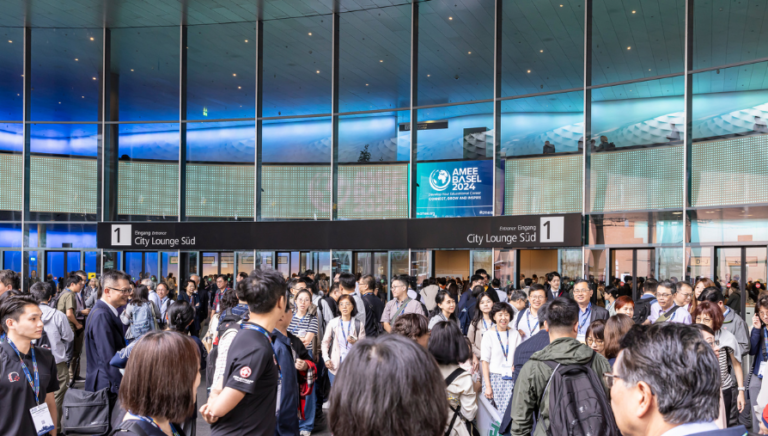AMEE 2025 Abstracts
Submission Guidelines
Our Abstract Submission Guidelines provide full information on the Terms and Conditions of your submission
If you have any questions please contact the AMEE team:

Decisions Announced
- Pre-Conference Workshops – Decisions Announced – 27/11/2024
- Symposia – Decisions Announced – 27/11/2024
- Research Papers – Decisions Announced – 12/12/2024
- Doctoral Papers – Decisions Announced – 12/12/2024
- Patil Teaching Innovation Award – Decisions Announced – 10/12/2024
- CPD Track – Decisions Announced – 16/12/2024
Undergoing Review
- Short Communication, ePoster, Fringe, PechaKucha, Point of View, Workshops
Submission Deadlines
- Short Communication, ePoster, Fringe, PechaKucha, Point of View, Workshops - Closed on 29th January 2025
- CPD, Doctoral Reports, Patil Teaching Innovation Awards, Research Papers - Closed on 30 October 2024
- Pre-conference Workshops and Symposia - Closed on 23 October 2024
The abstract portal will close at 23:59hrs (UK TIME) on the dates specified. Extensions will not be possible.

Educational Themes and Tracks
The theme or track you choose for your abstract will determine which reviewers it is sent to and which group makes the decision about its inclusion in the programme. We appreciate some submissions will span more than one theme and you should choose which one is the best fit for your work.
Educational Theme
Exploring innovative approaches to the assessment and selection of learners into health professions education programmes at all levels, and those which aim to enhance diversity and excellence in the field.
This theme examines how Artificial Intelligence and technology enhance learning in health professions education, including AI’s role in personalising training and informing clinical decisions. It also covers technology’s broader applications, such as innovative content delivery, virtual environments and gamification.
Covers all aspects of assessment and feedback in the health professions, including written tests, clinical exams and workplace-based assessment, as well as performance appraisal. This theme also includes work in relation to Competency-Based Education in the Health Professions (CBE-HP).
Includes approaches to course and curriculum development, topic selection, instructional design, needs assessment and any other aspects of the planning process whether at activity, course, or curriculum level.
Covers high-level issues faced by medical schools and other training providers where decisions are required about what type of programmes will be offered, to which types of learners, and by which staff members, and how these programmes are delivered, monitored, and improved.
Covers issues such as challenging bias and stereotypes, widening participation and improving representation in health professions education.
Abstracts submitted in this theme should relate specifically to the professional development of teachers or trainers of health professionals – i.e., the education faculty – whether at the individual or organisational level. This track also covers topics such as professional identity formation amongst health professions educators, evaluation of teacher performance and career progression of educators.
This theme explores the integration of the humanities into health professions education to foster empathy, ethical reasoning and a holistic understanding of patient care.
Studies or initiatives specifically designed to promote learning across professions or disciplines, as well as those more generally aimed at encouraging team working
This theme is concerned with patient safety education – for example, how patient safety can be embedded into educational programmes and practices or learning from patient safety data. Submissions related to quality improvement science and human factors education are also welcome in this category.
This theme is concerned with any factors which may affect how and what learners learn. It includes topics such as student support and engagement, stress, wellbeing, and burnout, as well as studies exploring the learning environment and the characteristics and choices of learners.
This theme covers any aspect of teaching, learning or assessment to promote sustainability in health professions education. It involves initiatives to equip learners or teachers with the knowledge, skills, values, competence, and confidence they need to sustainably promote the health, human rights and well-being of current and future generations, while protecting the health of the planet.
Abstracts submitted to this theme should relate to educational delivery, whether this is face-to-face, online or blended. It includes the format and methods selected, group size and group management strategies.
This theme replaces the previous ‘Education Research’ track, in acknowledgement that scholarship of education is a broader area of work. Abstracts relating to the research process from start to finish, such as applying for funding, research ethics, data-sharing, methodology, theory, and dissemination can be submitted in this track, along with work exploring how research and scholarship is encouraged and supported in more general terms.
Tracks
Continuing Professional Development of healthcare professionals (CPD) refers to the process of ongoing, lifelong learning to maintain competence, licensure and/or certification. CPD encompasses the period of time a healthcare professional is in practice following the completion of their formal training.
The healthcare landscape thrives on collaboration across diverse professions, each contributing unique perspectives and expertise. This theme, Expanding Horizons: All Health Professions, invites submissions that explore the interconnections, synergies, and challenges shared across the health professions, including dentistry, nursing, physiotherapy, veterinary medicine, physician associates, public health, medicine and others. This theme highlights the integral role of all professions in shaping the future of health professions education and care.
We encourage presentations and posters that emphasize interprofessional collaboration, integrated care models, cross-profession learning, and the shared challenges of education, leadership, and practice. The goal is to foster dialogue and innovation, drawing on the diverse strengths and experiences of all health professions to enhance the quality of education and patient care globally.
With representation from a wide spectrum of healthcare disciplines, this theme aims to create a collaborative, inclusive forum that reflects the shared commitment to excellence and the transformation of healthcare through education.
Abstracts are invited for short communication and ePosters only. You should only submit your work once. Please choose whether you would like your work to be considered for this track or for one of the other educational themes. Please note that you should not submit your work in more than one area.
Teaching, learning and assessment as it relates to surgery in undergraduate or postgraduate education and continuing professional development.
Abstracts are invited for short communication and ePosters only.
Phase of Education
In addition to selecting a theme or track you will be asked to indicate which phase of education your work is relevant to, which will allow it to be considered for inclusion in any CPD or Postgraduate tracks in addition to any theme-based tracks.
- Pre-Admission
- Undergraduate and Graduate
- Postgraduate
- CPD
- Generic

Presentation Locations

In Person Only
In Person, Online, OnDemand
In Person or OnDemand
